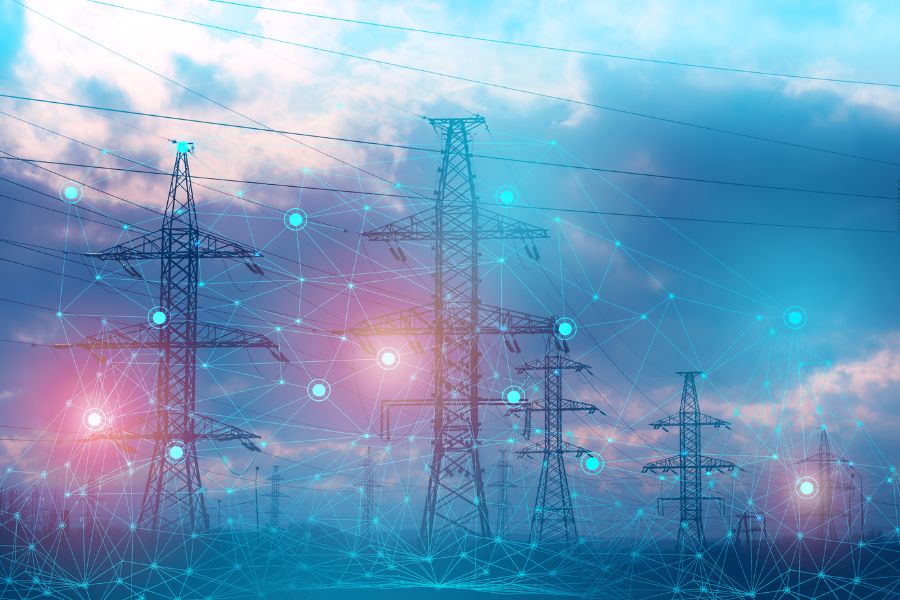How does The Energy Industry Prepare for Cyber Attack on Power Grid
December 5, 2023, 8 min read
MonEvery day brings new advancements in the cyber sphere, some favorable and some unpleasant, and your information is no longer the only valuable asset. Every day, thousands of breaches occur. Unskilled individuals steal data using Wi-Fi, credit card skimming at gas stations, and social engineering to obtain sensitive information (PII). The inconveniences of ransomware, ID theft, data leaks, and “script kiddie” DDoS (distributed denial of service) assaults are all unpleasant. Critical facets of society, such as grocery shopping, bill payment, maintaining electricity, clean water, and operational hospitals, are also potential weak spots. The danger of an attack using these openings is greater than ever. So, what are your options in a cyber attack on the power grid?
Significant shifts have occurred in the electric grid’s environment in recent years. Increased deployment of both established and novel types of distributed energy resources, in particular, contributed to the renewable energy market’s explosive expansion in 2021. (DERs). The increasing popularity of DERs calls for hastening the introduction of distributed energy resource management systems (DERMS) and the complete digital transformation of power grids.
The digital transformation of the industry has led to a heightened focus on cyber security and the comprehension of vulnerabilities in both the electric grid and the global supply chain, even as the evolution of the smart grid addresses the inherent need for stability and flexibility among power systems. Energy systems have become a common target for big cyber schemes due to the outdated and rudimentary infrastructure employed by most utility firms and the lack of priority in sophisticated protection equipment. While utilities have been slow to embrace digital transformation, now is the moment to do so, as high-profile cyber attacks are increasingly employed as tactics during political and civil turmoil.
How to Prepare for Cyber Attack on Power Grid?
According to the information presented thus far, the effects of a “grid-down” attack can be either permanent or temporary. For the time being, it’s a no-brainer to invest in a backup power supply. Generators are effective, but they can be expensive to run and use either diesel or natural gas, making them impractical for some apartment dwellers. Backup batteries or power banks are viable alternate sources, especially if you are short on cash or storage space.
The possibility of a sophisticated, state-sponsored attack is beginning to show how fragile the grid may be, but power plants have always been at risk.
As a bonus, power tool batteries and inverters are a good option since they provide long-term, low-voltage power for everyday household necessities like medical equipment, lighting, and heated blankets. Last, boat and automotive batteries are an excellent option because they can be charged with solar panels over time and provide a respectable quantity of energy even if you run out of gas while trying to charge them. Affordable solar panels for houses can provide a welcome jolt of energy if the power they generate can be stored in even modest battery banks.
The trend toward standardized security protocols is encouraging. Still, organizations at all levels of government and business must keep in mind the need to establish a solid cybersecurity posture and adopt rules that make assessment and security procedures available to all. To permanently alter the way the sector combats these new and long-term cybersecurity threats, utility companies, system operators, and technology providers must continue prioritizing security technology and putting these measures into practice now.
When the Power goes off, What will Happen?
It doesn’t matter what kind of government emergency plan is in place; it won’t be able to handle the stress of a grid-down event.
A grid failure will initially cause a blackout similar to any other. The emergency response and cleanup operations will proceed as scheduled. Most businesses will have contingency plans to continue operating normally during a minor interruption, just like during a complete blackout.
However, those plans only apply in the event of a short-term blackout, not an ongoing one.
If the power system fails, modern civilization as we know it will cease to function immediately. When hordes of hungry strangers burst into your house at night, the only use for your phone will be to look at old photos or activate the flashlight feature.
Three Basics Humans Can’t Live Without
Every system that is fully automated and dependent on the internet will crash. Water, food, and money are the three basics humans can’t live without. After only a month without these, civilization would start to fall apart.
Urban dwellers will be left without potable water without a connection to the municipal water system. If the grid goes down, backup generators and emergency power sources can’t keep pump stations running forever. This would lead to a complete shutdown of municipal water systems and a subsequent sewage backup.
Many farms and food manufacturers rely on mechanized service, feeding, and harvesting systems. Therefore, food safety is a crucial issue. As a bonus, a digital system controls the refrigeration and transportation of food from suppliers.
Produce delivery trucks follow a computer-generated timetable, supermarkets lack the infrastructure to refrigerate perishable goods properly, and supply will fall short of demand. According to some studies, after a week of a grid down, social unrest will break out as people get increasingly frustrated at the lack of food.
The ability to use gas stoves to prepare meals and refrigerators to store perishables will be lost in the event of a grid failure.
Money Lose
When it comes to money, we are stuck with the system we have. Most of us keep our savings in banks, which would be vulnerable to attack if the power went out. Our electronic money, automated teller machines, card services, and credit systems rely on energy.
Since most individuals would not have had that much cash before the grid was down, they would not have enough money to buy food or services after the first week.
Most of these shortages will arise from insufficient transportation and power. However, that’s not what’ll ultimately do us in. The greatest threat will occur a week or a month after a grid-down scenario when a significant portion of the population is hungry and battling for food and water for their family.
Getting ready for a Grid Outage
The electricity grid is undeniably one of the nation’s most vulnerable points. A country can be destroyed by an electromagnetic pulse (EMP), and it would take more than a year to rebuild its power grid afterward.
It’s not simple to get ready for this potential outcome. Preparing for a storm or natural disaster will be considerably less complicated. A short duration characterizes these occurrences. After one week without power, society will likely collapse due to poverty, hunger, anarchy, and other adverse outcomes.
To be ready for such an occurrence, you need more than just a stockpile of food and a set of emergency supplies. Learning to survive without modern conveniences and creating reliable systems for gathering water and sustaining one’s diet is essential.
Should the electrical system ever go down, you can do a few things to be ready.
Light
Being able to see is crucial in the event of a blackout. Remember that you’ll need a backup illumination source if your flashlight’s batteries die. Stock up on candles and oil lamps in case the power goes out. A hand-cranked flashlight is another valuable item to have on hand.
Earlier, I explained how crucial batteries are. They could be handy for devices like lighting, radios, and more. You might want to invest in rechargeable batteries and a charger to conserve your generator’s power.
Life-sustaining water
Keep a few cases of bottled water on hand at all times. You should fill up your sinks and baths with water if you think the power could go out and you won’t get to a store to buy water. Learning how to distill water is functional as well.
Food
Some foods don’t need to be refrigerated, but others must be stored at a specific temperature to prevent rotting. Put the food in a sealed tub and leave it in the snow if you lose power throughout the winter. It’s essential to keep the refrigerator door closed as much as possible throughout the summer to retain the cold inside.
Storage
Be ready for everything that may happen by always keeping an emergency kit handy. You should have candles, matches, water, a battery-operated radio, canned and dried food, and even food for your pets.
The greatest way to stay alive under this prepper’s worst-case scenario is to band together with a group of people who share your values so that you can all work together to cultivate food, collect water, maintain security, and reconstruct society.
Prepare The Energy Industry for Potential Cyber Attack
Preparing the energy industry for potential cyber attacks on the power grid involves several crucial steps to mitigate risks and ensure resilience:
Risk Assessment and Monitoring
Conduct comprehensive risk assessments to identify vulnerabilities in the power grid’s systems. Implement continuous monitoring to detect any unusual activities or potential threats.
Robust Cybersecurity Measures
Invest in robust cybersecurity protocols, including firewalls, encryption, intrusion detection systems, and regular security updates. Implement multi-factor authentication and access controls to safeguard critical infrastructure.
Employee Training and Awareness
Educate employees about cyber threats, phishing attacks, and best practices in cybersecurity. Human error can be a significant vulnerability, so ensuring staff are vigilant and well-trained is crucial. There are many trusted cyber security awareness training providers you can lean on.
Collaboration and Information Sharing
Foster collaboration between public and private sectors, sharing threat intelligence and best practices. Collaborative efforts can enhance the ability to detect and respond to emerging cyber threats.
Incident Response Planning
Develop and regularly test incident response plans to ensure a swift and effective response in case of a cyber attack. Define clear roles and responsibilities for different scenarios.
Backup and Recovery Systems
Maintain robust backup systems and recovery protocols to restore operations quickly in case of a successful cyber attack, minimizing downtime and potential disruptions.
Regulatory Compliance
Comply with industry regulations and standards while continuously improving cybersecurity measures. Regular audits and compliance checks are essential.
Investment in Emerging Technologies
Explore emerging technologies like AI and machine learning for threat detection and response and blockchain for secure transactions and data integrity.
Physical Security Measures
Implement physical security measures to protect critical infrastructure from physical access by unauthorized individuals or entities.
Continual Improvement and Adaptation
Cyber threats evolve rapidly, so it’s essential to continually assess, adapt, and improve cybersecurity strategies and technologies to avoid potential threats.
By combining these strategies and maintaining a proactive stance toward cybersecurity, the energy industry can better prepare itself to defend against cyber attacks and ensure the stability and security of the power grid.
Sum-Up
In this article we addresses the vulnerabilities and potential outcomes of a grid-down event, stressing the crucial need for preparation and proactive measures, particularly in the context of cyber threats to the energy sector.
It begins by highlighting the possibility of permanent or temporary effects from a “grid-down” attack, urging investment in backup power supplies due to the fragility of power systems. It explores various backup options, such as generators, batteries, power banks, inverters, and solar-charged batteries, emphasizing their usefulness in different scenarios.
Ultimately, you should develop a proactive approach for both individuals and the energy sector in anticipating and mitigating the potentially catastrophic consequences of a grid-down event, whether due to cyber attacks or other causes.




























